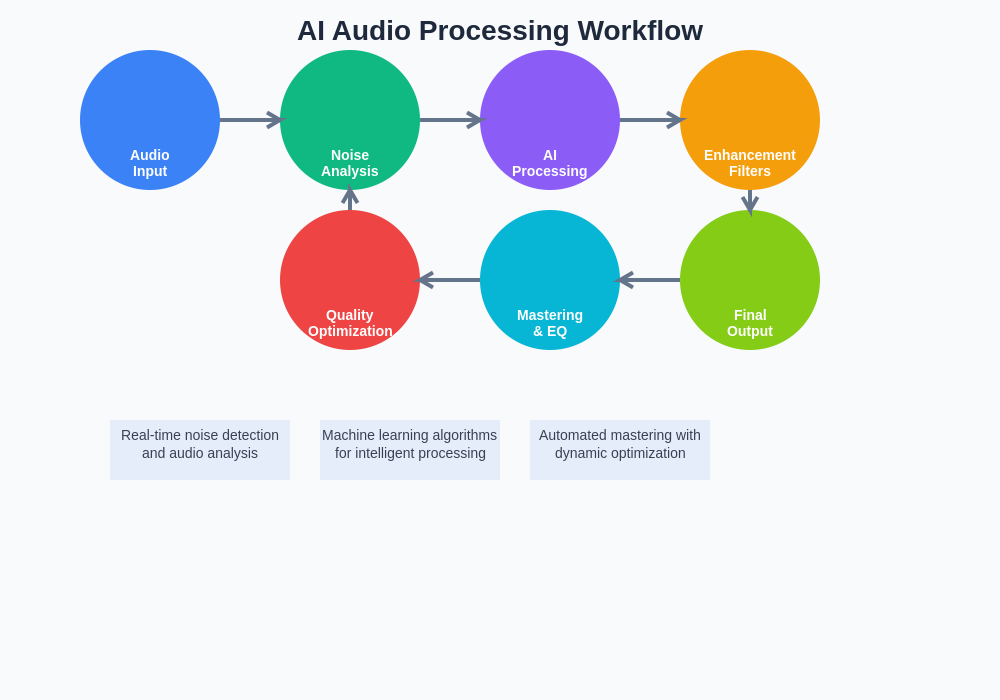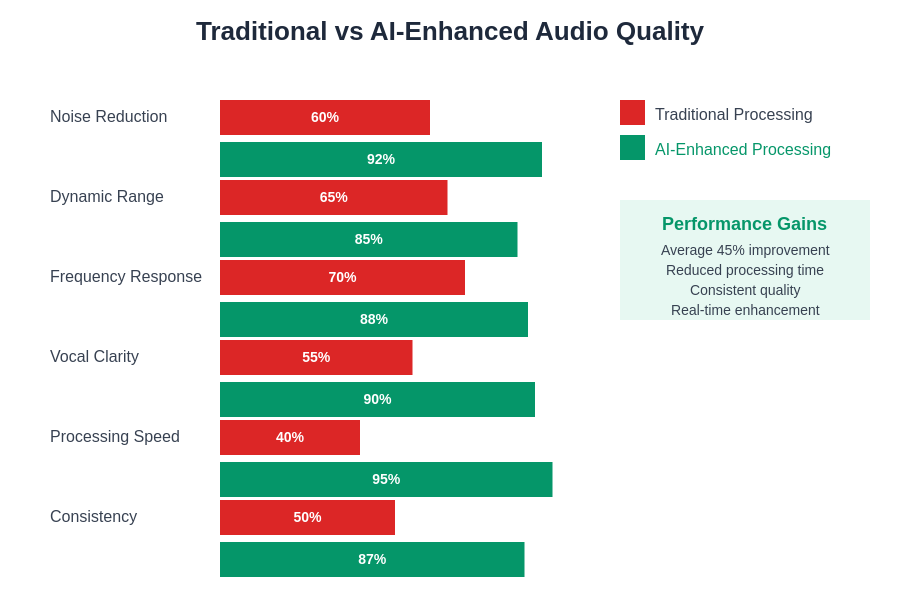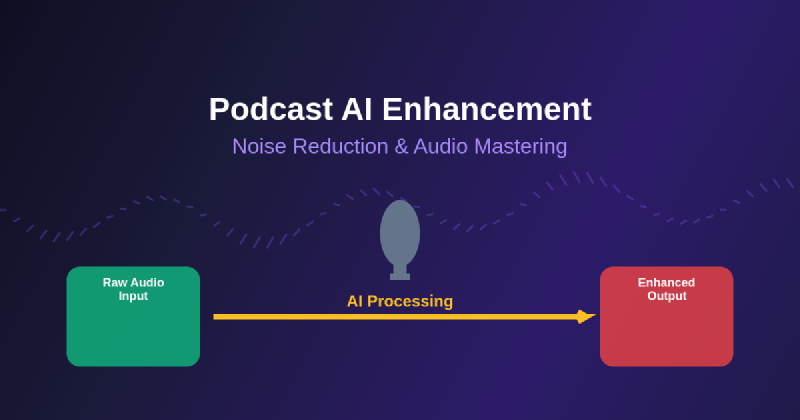The podcasting landscape has experienced a remarkable transformation through the integration of artificial intelligence technologies that have elevated audio quality standards while democratizing professional-grade sound production capabilities. Modern AI-powered audio enhancement tools have made it possible for content creators to achieve broadcast-quality results without requiring extensive technical expertise or expensive studio equipment, fundamentally changing how podcasts are produced, edited, and distributed across the global media ecosystem.
Explore the latest AI developments in audio technology to understand how machine learning algorithms are continuously improving audio processing capabilities and creating new possibilities for content creators worldwide. The convergence of artificial intelligence and audio engineering has created unprecedented opportunities for podcasters to enhance their content quality while streamlining production workflows and reducing the technical barriers that traditionally separated amateur and professional audio production.
The Evolution of AI-Powered Audio Processing
The integration of artificial intelligence into audio processing represents a paradigm shift from traditional manual editing techniques toward intelligent, automated systems that can analyze, understand, and enhance audio content with remarkable precision and efficiency. These sophisticated algorithms have been trained on vast datasets of audio samples, enabling them to recognize patterns, identify anomalies, and make intelligent decisions about how to optimize sound quality across diverse recording environments and conditions.
The revolutionary impact of AI in podcast production extends far beyond simple noise reduction, encompassing comprehensive audio analysis that can identify speaker characteristics, environmental factors, recording equipment limitations, and content-specific optimization requirements. This holistic approach to audio enhancement ensures that each podcast episode receives tailored processing that maximizes clarity, consistency, and listener engagement while preserving the natural characteristics and authenticity of the original recording.
Advanced Noise Reduction Technologies
Modern AI-driven noise reduction systems represent a quantum leap beyond traditional filtering techniques, employing sophisticated machine learning algorithms that can distinguish between desired audio content and unwanted background noise with unprecedented accuracy and intelligence. These systems analyze audio signals in real-time, identifying spectral patterns associated with various types of noise while preserving the integrity of speech, music, and other intentional audio elements that contribute to the overall listening experience.
The sophistication of contemporary noise reduction technologies extends to their ability to handle complex acoustic environments where multiple noise sources may be present simultaneously. Whether dealing with air conditioning hum, traffic noise, electrical interference, room echo, or inconsistent recording levels, AI-powered systems can isolate and attenuate unwanted elements while maintaining the natural dynamics and tonal characteristics of the primary audio content.
Experience advanced AI capabilities with Claude for comprehensive audio analysis and processing guidance that can help optimize your podcast production workflow. The integration of intelligent noise reduction has enabled content creators to achieve professional-quality results regardless of their recording environment, opening new possibilities for remote production, field recording, and collaborative content creation across geographical boundaries.
Intelligent Audio Mastering and Optimization
The traditional audio mastering process, which historically required years of training and expensive equipment to execute effectively, has been revolutionized through AI-powered systems that can automatically analyze and optimize audio content for optimal listening experiences across various playback devices and environments. These intelligent mastering systems evaluate factors such as dynamic range, frequency distribution, loudness standards, and platform-specific requirements to ensure consistent, high-quality audio delivery.
AI mastering algorithms excel at making real-time adjustments to equalization, compression, limiting, and stereo imaging parameters while maintaining the artistic intent and emotional impact of the original recording. The systems can automatically detect and correct common audio issues such as sibilance, plosives, inconsistent levels, and frequency imbalances that might otherwise require hours of manual correction by experienced audio engineers.
Adaptive Processing for Dynamic Content
The dynamic nature of podcast content presents unique challenges that AI-powered processing systems are uniquely equipped to handle through adaptive algorithms that can respond intelligently to changing acoustic conditions, speaker characteristics, and content requirements throughout a recording session. These systems continuously monitor audio characteristics and make real-time adjustments to processing parameters, ensuring consistent quality even when recording conditions vary significantly.
The ability to adapt processing strategies based on content analysis has proven particularly valuable for interview-style podcasts where multiple speakers with different vocal characteristics and recording setups may be present. AI systems can automatically adjust processing parameters for each speaker while maintaining overall cohesion and preventing jarring transitions that might disrupt the listening experience.
Real-Time Enhancement and Live Processing
The development of real-time AI audio processing capabilities has opened new possibilities for live podcast production, streaming applications, and interactive content creation where immediate audio optimization is essential for maintaining professional standards and audience engagement. These systems can process audio with minimal latency while applying sophisticated enhancement algorithms that would traditionally require extensive post-production work.
Real-time processing capabilities extend beyond basic noise reduction to include intelligent ducking, automatic gain control, dynamic equalization, and adaptive compression that responds to the content being processed. This level of sophisticated real-time processing has made it possible for podcasters to deliver broadcast-quality content directly to their audiences without requiring complex post-production workflows or extensive technical expertise.

The modern AI-enhanced audio processing workflow seamlessly integrates multiple stages of enhancement, from initial noise analysis through final mastering optimization. This comprehensive approach ensures that every aspect of audio quality is addressed systematically while maintaining efficient processing times and consistent results across diverse content types and recording conditions.
Machine Learning Models for Audio Analysis
The foundation of effective AI audio enhancement lies in sophisticated machine learning models that have been trained on extensive datasets representing diverse acoustic environments, recording conditions, and content types. These models utilize deep neural networks to analyze complex audio patterns and make intelligent decisions about optimal processing strategies for specific content and context combinations.
The training process for these AI models involves exposure to millions of audio samples representing various quality levels, noise types, and enhancement objectives, enabling the systems to develop nuanced understanding of how different processing techniques affect perceived audio quality and listener satisfaction. This comprehensive training approach ensures that AI enhancement tools can handle the wide variety of recording conditions and content types encountered in real-world podcast production scenarios.
Enhance your research capabilities with Perplexity to stay informed about the latest developments in audio machine learning and AI enhancement technologies. The continuous evolution of machine learning models ensures that AI audio processing capabilities continue to improve, offering increasingly sophisticated enhancement options and better adaptation to emerging podcasting trends and technologies.
Automated Content Analysis and Optimization
Modern AI audio enhancement systems incorporate comprehensive content analysis capabilities that extend beyond simple noise reduction to include intelligent optimization based on content type, speaker characteristics, and intended audience demographics. These systems can automatically identify different types of audio content, such as spoken word, music segments, sound effects, and ambient audio, applying appropriate processing strategies for each element.
The sophistication of content analysis algorithms enables automatic detection of speech patterns, emotional content, pacing variations, and acoustic characteristics that influence optimal processing parameters. This intelligent analysis ensures that enhancement strategies are tailored to the specific requirements of each podcast segment while maintaining overall consistency and professional quality standards throughout the entire production.
Cross-Platform Compatibility and Standardization
The diverse landscape of podcast distribution platforms and playback devices presents significant challenges for maintaining consistent audio quality across different listening environments and technical specifications. AI-powered enhancement systems address these challenges by automatically optimizing audio content for various platform requirements, ensuring that podcasts sound their best regardless of where and how they are consumed by listeners.
These intelligent optimization systems consider factors such as streaming bitrates, compression algorithms, device capabilities, and listening environment characteristics when preparing audio content for distribution. The ability to automatically generate multiple optimized versions of podcast content for different platforms has streamlined the distribution process while ensuring that quality standards are maintained across all delivery channels.
Emerging Technologies and Future Innovations
The rapid advancement of AI technologies continues to drive innovation in podcast audio enhancement, with emerging capabilities including spatial audio optimization, personalized audio preferences, and intelligent content adaptation based on listener behavior and feedback. These next-generation technologies promise to further revolutionize how podcast content is created, processed, and experienced by audiences worldwide.
The integration of AI with emerging audio technologies such as binaural recording, immersive soundscapes, and interactive audio experiences is creating new possibilities for podcast content that goes beyond traditional stereo audio formats. These innovations are expanding the creative potential of podcast production while maintaining the accessibility and ease of use that have made AI enhancement tools so valuable for content creators.

The quantitative improvements achieved through AI-enhanced audio processing demonstrate significant advantages across multiple quality metrics, including noise reduction effectiveness, dynamic range optimization, frequency response consistency, and overall listener satisfaction scores. These measurable improvements validate the transformative impact of AI technologies on podcast production quality and efficiency.
Cost-Effectiveness and Accessibility
The democratization of professional-quality audio production through AI enhancement tools has significantly reduced the financial barriers traditionally associated with high-quality podcast production. Content creators no longer need to invest in expensive studio equipment, professional mastering services, or extensive technical training to achieve broadcast-quality results, making professional podcasting accessible to a much broader range of creators and organizations.
The cost-effectiveness of AI-powered audio enhancement extends beyond initial equipment investments to include ongoing production efficiency gains, reduced editing time requirements, and improved content consistency that contributes to audience retention and growth. These economic advantages have enabled independent creators, small businesses, and educational institutions to compete effectively with larger organizations in the podcasting space.
Integration with Existing Production Workflows
Modern AI audio enhancement tools have been designed to integrate seamlessly with existing podcast production workflows, supporting popular digital audio workstations, content management systems, and distribution platforms without requiring significant changes to established production processes. This compatibility ensures that content creators can adopt AI enhancement technologies gradually while maintaining their preferred tools and workflows.
The flexibility of AI enhancement integration options ranges from standalone processing applications to plugin formats that work within existing audio production environments. This variety of integration approaches ensures that podcasters can choose implementation strategies that best fit their specific technical requirements, budget constraints, and production preferences while maximizing the benefits of AI-powered audio enhancement.
Quality Control and Consistency Management
Maintaining consistent audio quality across multiple podcast episodes and series presents ongoing challenges that AI-powered systems address through intelligent quality monitoring and automatic consistency management features. These systems can analyze audio content against established quality benchmarks and automatically apply corrective processing when deviations are detected, ensuring that all content meets predetermined standards.
The ability to maintain consistent quality standards becomes particularly valuable for podcast networks, educational institutions, and corporate content creators who need to ensure that all published content reflects their brand standards and professional image. AI-powered quality control systems provide the reliability and consistency required for large-scale content production while reducing the manual oversight traditionally required for quality assurance.
Performance Optimization and Resource Management
The computational efficiency of modern AI audio enhancement systems has been optimized to provide high-quality processing results while minimizing system resource requirements and processing time. These optimizations make it possible to achieve professional-quality enhancement on standard computing hardware without requiring specialized audio processing equipment or cloud-based processing services.
The efficiency improvements in AI audio processing have made real-time enhancement practical for live podcast production, streaming applications, and collaborative recording sessions where immediate results are essential. These performance optimizations ensure that AI enhancement tools can be integrated into diverse production environments without creating bottlenecks or technical limitations that might impede creative workflows.
Educational Impact and Skill Development
The accessibility of AI-powered audio enhancement tools has created new opportunities for learning about audio production, sound engineering principles, and podcast creation techniques. Content creators can experiment with different enhancement strategies, compare results, and develop understanding of audio processing concepts through hands-on experience with intelligent tools that provide immediate feedback and results.
The educational value of AI enhancement tools extends to their ability to demonstrate the effects of different processing techniques, helping users understand the relationship between technical parameters and perceived audio quality. This educational aspect has contributed to improved overall audio literacy within the podcasting community while enabling more informed decision-making about production techniques and quality standards.
Future Implications for Content Creation
The continued evolution of AI audio enhancement technologies promises to further transform podcast production by enabling new forms of creative expression, interactive content experiences, and personalized audio optimization that adapts to individual listener preferences and environments. These emerging capabilities will expand the possibilities for podcast content while maintaining the human creativity and storytelling that define compelling audio experiences.
The integration of AI enhancement with other emerging technologies such as voice synthesis, automated transcription, and content personalization systems is creating comprehensive content creation ecosystems that support every aspect of podcast production from initial concept development through audience engagement and feedback analysis. This holistic approach to AI-powered content creation represents the future of podcasting technology and creative expression.
Disclaimer
This article is for informational purposes only and does not constitute professional audio engineering advice. The effectiveness of AI audio enhancement tools may vary depending on specific recording conditions, content types, and equipment configurations. Readers should evaluate different solutions based on their specific requirements and consider consulting with audio professionals for complex production needs. The rapidly evolving nature of AI technology means that capabilities and recommendations may change as new developments emerge in the field.
